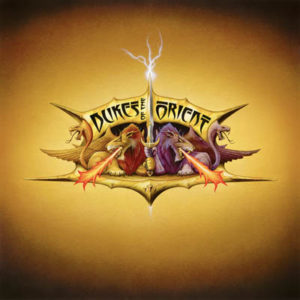One of the more frustrating aspects of the second and third tier niche labels is that they seem not to push very hard. They are happy to get recognizable names on their roster, and those recognizable names – past the interested gaze of the major labels – are only too happy to have backing. There’s nothing wrong with this as an approach, and I generally believe that it’s a fine thing that artists are able to continue after the initial heat of the corporate music machine has cooled off.
Even so, the stakes are so low for either party that only occasionally do the individuals respond with something ambitious and surprising. Frontiers Music is one of those labels that requires a whole lot of caution and a bit of research on the part of the buying public. At times they shock the public with something that exceeds expectations, as with Toto’s standout revival Toto XIV, and at other times they put out things that have potential on paper yet fail to take advantage of the opportunity set before them, like last year’s All 4 1 album.
 The eponymous debut of Dukes of the Orient straddles a middle line between promise and competency, and part of that inability to jump in all the way seems to me to be an inherent problem with the concept itself: this is not a band. Rather, it was a band, or parts of a band, but now it is a reconfiguration or reboot. Dukes of the Orient features John Payne who, for many years, was the lead singer of the prog/AOR band Asia. When original singer John Wetton was brought back into the fold for an original lineup reunion, Payne continued on with Asia’s then-lead guitarist Guthrie Govan and drummer Jay Schellen as G.P.S.
The eponymous debut of Dukes of the Orient straddles a middle line between promise and competency, and part of that inability to jump in all the way seems to me to be an inherent problem with the concept itself: this is not a band. Rather, it was a band, or parts of a band, but now it is a reconfiguration or reboot. Dukes of the Orient features John Payne who, for many years, was the lead singer of the prog/AOR band Asia. When original singer John Wetton was brought back into the fold for an original lineup reunion, Payne continued on with Asia’s then-lead guitarist Guthrie Govan and drummer Jay Schellen as G.P.S.
There was a problem with G.P.S. It was twice as difficult to capitalize on the years Payne served as Asia’s lead under this new moniker. Eventually, Payne formed Asia featuring John Payne which ran concurrent to “Classic” Asia. Throughout this period, beginning in 2007, Payne was working on an AfJP release initially called Architect of Time, later called Americana, but not completed. His keyboard player during the earlier phases was Erik Norlander, known for his own releases as well as those with his band Rocket Scientists and with his wife Lana Lane.
After Wetton passed away in 2017 due to cancer, Payne made the decision to not go on – at least on record – as Asia featuring John Payne. (Purportedly, he will continue with this name when touring.) This left a significant problem, being nearly ten years of writing for an album with the input of several figures who floated in and out of the AfJP orbit. With Norlander being a substantial contributor to some of the material, it made sense to reenlist him.
So what Dukes of the Orient is, essentially, is a long-gestating Asia featuring John Payne album. There are so many nods to this baked into the concept that one could never call it a “sly nod.” It’s more like a “neck-breaking cranial tremor.” The track “Seasons Will Change” was actually released as an EP under the AfJP band name. The cover is painted by Rodney Matthews, the cover artist for John Payne’s Asia years. The iconography on the DotO cover features fire-breathing lions and dragons, both totems of Payne’s Asia output. And there’s the obvious “Asia” and “Orient” tie-in.
 That is a convoluted path to take to arrive at an album that is…okay. The lyrics are heavy-handed, labored and laden with false portent, but that was always a problem with Asia, both old and new. They either went for fantasy-novel bombast or overly simplistic arena rock escapism about women won and lost, and seldom did the two converge as a satisfying hybrid on that level. Really, the attraction of Asia was that the musicianship was often so much more than the material called for. So it is for Dukes of the Orient. Norlander is an unsung keyboard slinger, known as a highly talented pro in some circles but never reaching the larger level of notoriety. Payne has always put his guts into his work, at times to that work’s detriment. His earliest Asia contributions sounded too hair-metal for surroundings. He was able to rein it in later on. I happen to think he was hitting his stride with 2004’s Silent Nation, but reunion fever was in the air and the writing, as they say, was all over the wall. Suffice it to say that Payne’s ability to attenuate for the sake of the song improved greatly, revealing a genuinely good voice beneath all the bluster.
That is a convoluted path to take to arrive at an album that is…okay. The lyrics are heavy-handed, labored and laden with false portent, but that was always a problem with Asia, both old and new. They either went for fantasy-novel bombast or overly simplistic arena rock escapism about women won and lost, and seldom did the two converge as a satisfying hybrid on that level. Really, the attraction of Asia was that the musicianship was often so much more than the material called for. So it is for Dukes of the Orient. Norlander is an unsung keyboard slinger, known as a highly talented pro in some circles but never reaching the larger level of notoriety. Payne has always put his guts into his work, at times to that work’s detriment. His earliest Asia contributions sounded too hair-metal for surroundings. He was able to rein it in later on. I happen to think he was hitting his stride with 2004’s Silent Nation, but reunion fever was in the air and the writing, as they say, was all over the wall. Suffice it to say that Payne’s ability to attenuate for the sake of the song improved greatly, revealing a genuinely good voice beneath all the bluster.
But the Dukes of the Orient material lets both creators down. There are many moments that sound like they’re shooting for that Asia legacy, but few that have the same drive for their own. Rather than rehab a decade’s worth of material, several songs required a full rewrite, or at least a reexamination. The opening “Brother in Arms” and “Strange Days” both suffer from the tension of ambition and coasting, and wind up leaning harder on the latter.
The closing “Give Another Reason” wants to act as a mission statement, a flag that’s put down with the assurance that “we are a prog rock band” but the overall effect is regressive. The stuff in the middle never grabs the listener in that way a new thing ought to, with surprises, an unexpected turn of melody, or that special something that demands you listen again. It strikes the listener as would an old painting in a slightly new frame while, at the same time, announcing itself as an all-new entity.
The word I keep coming back to is “competence.” Dukes of the Orient is good enough to not make me cringe the way the All 4 1 album did, but never makes the most of its chances the way the Toto album did. It steadfastly plays it safe as it runs out the work put into the Asia featuring John Payne compositions, but doesn’t have the confidence to bury those compositions and give rise to newer, better versions.
Dukes of the Orient is just happy to be, but it’s not a feeling that gets transmitted to or absorbed by the listener. Instead, the adequacy undermines what could have been a real turning point for both creators rather than a garage sale.





Comments